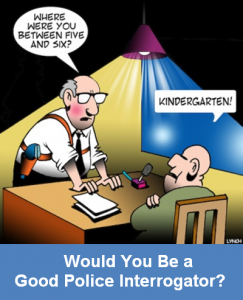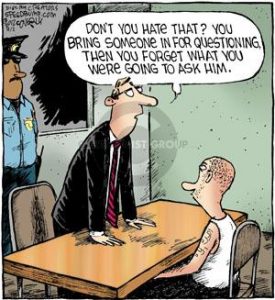 Interrogation. Just the word elicits your vision of forcible confinement in a hot and windowless room, shoved in a wooden chair with one leg shorter than others, a bright light from a bare bulb burning over your head, and hulking forms of trench-coated detectives firing hardboiled questions in your face. The truth is different. A lot different. There’s a high skill involved in getting useful information from people, and not everyone is cut out for the job. Are you? Would you be a good police interrogator?
Interrogation. Just the word elicits your vision of forcible confinement in a hot and windowless room, shoved in a wooden chair with one leg shorter than others, a bright light from a bare bulb burning over your head, and hulking forms of trench-coated detectives firing hardboiled questions in your face. The truth is different. A lot different. There’s a high skill involved in getting useful information from people, and not everyone is cut out for the job. Are you? Would you be a good police interrogator?
To start, drop the “interrogation” word. It’s not correct to say “interrogation” in today’s professional police procedures. The right terms are “interview” and “dialogue exchange”. And, they’re more applicable because the vast majority of police-civilian interactions are respectful interchanges of relevant information.
I’ve spent a good part of my life talking to people and getting information. I learned long ago that you get more bees with honey than you do with vinegar. I also learned you slide a lot further on bullshit than you do on gravel. I made those principles the core of my information-gathering days. I also practiced another fundamental rule. That’s that the best interrogators interviewers are the best listeners.
Where’s this going? I subscribe to Psychology Today. I recently read a piece by Mary Ellen O’Toole, Ph.D. in her regular column Criminal Minds where she set out ten questions with graded responses to her Are You A Good Listener Test. Dr. Mary Ellen O’Toole was a senior profiler at the FBI’s Behavioral Analysis Unit and author of Dangerous Instincts: How Gut Feelings Betray Us. Here’s her short ten-question exam to see if you would be a good police interrogator. Sorry… police interviewer.
ARE YOU A GOOD LISTENER TEST
1. Typically, how emotional (frightened, insecure, angry, etc.) do I get when I am attempting to interview someone? (Rate this on a scale of 1-3)
1 = very emotional
2 = nonemotional and detached
3 = I remain interested and tempered
2. Typically, how often do I interrupt?
1 = several times during a conversation
2 = just once or twice during a conversation
3 = almost never
3. Do I say things like “What? You have got to be kidding me,” – or- “That reminds me of the time I…” – or – “You think that’s bad, let me tell you about…”
1 = frequently
2 = sometimes
3 = rarely
4. Do I roll my eyes, put my head down, shake my head back and forth, throw myself back in my chair, turn away, get up and walk away, show signs of anger or threatening behavior, or otherwise display that I am not paying attention or do not like what the other person is saying?
1 = frequently
2 = sometimes
3 = rarely
5. Do I fidget until people stop talking and then immediately respond without considering what they’ve said?
1= frequently
2 = sometimes
3 = rarely
6. Do I let my mind wander to all the other things on my “to do” list and keep thinking that I just don’t have the time for this?
1 = frequently
2 = sometimes
3 = rarely
7. Do I wait until the nanosecond when the speaker goes to take a breath to pounce on him or her with my opinions?
1 = frequently
2 = sometimes
3 = rarely
8. Do I hijack the conversation? For instance by saying something like, “Look we’ve been over this a million times. Your ideas are just not going to work. This is what we are going to do.”
1 = frequently
2 = sometimes
3 = rarely
9. I reflect the person’s thoughts and feelings back to the person I am listening to.
1 = rarely
2 = sometimes
3 = frequently
10. I ask open-ended questions to encourage the other person to talk.
1 = rarely
2 = sometimes
3 = frequently
Total Score = ______
 The higher the score – the better your listening skills tend to be and the better interrogator interviewer you would be. Note: This is not a scientific test and has not been validated or otherwise vetted. These opinions are those of Dr. O’Toole and do not represent the views of the FBI.
The higher the score – the better your listening skills tend to be and the better interrogator interviewer you would be. Note: This is not a scientific test and has not been validated or otherwise vetted. These opinions are those of Dr. O’Toole and do not represent the views of the FBI.
My experience is that the key to successful information gathering is simply listening to what’s being said. Does it make sense? Does it fit? Does it make you ask more questions? Or does what’s being said to you satisfy what you’re after?
Let me know in the comments how you made out on the test!
